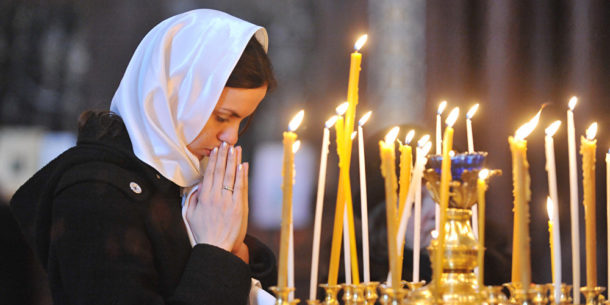St.George Russian Orthodox Church
Commemoration

Commemoration of our living and departed loved ones is perhaps the single best way that we can pray for them.
There is no doubt of the great efficacy of the Commemoration and need to remember our friends and loved ones (both the living and the dead) at the Divine Liturgy as often as possible. In order to facilitate the commemoration of both the living and the reposed we present here several options for your convenience.
If you want the commemoration lists you send to the Altar to be read attentively and unhurriedly, please remember to follow these rules:
- Commemorative lists should be offered before the beginning of the Liturgy. It is best to submit commemorative lists in the evening or early in the morning, before the service begins.
- While you are writing down the names of living and reposed, commemorate them with a clean heart, sincerely wishing them good, and striving to remember those whose names you are writing down. This already is a prayer.
- Bishops and priests are listed first, with their ranks (e.g. “for the health” of Bishop Tikhon, Abbot Tikhon, Priest Yaroslav). After listing bishops and priests, list your own name, and the names of your relatives and close acquaintances. The same applies to lists “for the repose (e.g. Metropolitan John, Archpriest Michael, Alexandra, John, Anthony, Elijah, etc.)
- Write legibly, entering no more than 10 names per page.
- Use the headings "for the salvation of" or "for the repose of."
- If written in Russian, names should be in the genitive case.
- Use the full form of the name, even if commemorating a child. (e.g. not Seryozha but Sergei.)
- Learn the church spelling of saints' names (e.g. not Polina but Apollinaria; not Artyom, but Artemus; not Yegor, but George).
- A child under 7 years of age is called an infant; from 7 to 18 years of age, a youth.
- Do not include surnames, patronymics, titles, or professions of those commemorated, and do not indicate their relationship to you.
- It is permissible to include the words "warrior," "monk," "nun," "ill," "traveling," or "imprisoned."
- Conversely, do not use the terms "erring," "suffering," "embittered," "studying," "grieving," "virgin," "widow," or "pregnant."
- In commemorating the reposed, use the terms "newly-translated", for one who has reposed within the past 40 days, "ever-memorable," or "murdered."
Lists of commemorations may be offered for the Proskomedia, the first part of the Liturgy, at which particles are taken from prosphoras for each of the names listed; later, the particles are put into the Chalice containing the Blood of Christ, as a prayer for the remission of sins of those commemorated is read.
Lists of commemorations may also be offered for Moleben and Panikhida services that are served after the Liturgy. In this case, commemorative lists should be offered separately. (From the book Fundamentals of Orthodox)
For Commemoration of the Living (Please, use PC to fill in sheet form)
For Commemoration of the Reposed (Please, use PC to fill in sheet form)
How do you pray for the Non-Orthodox?
We do not pray for the Non-Orthodox by name, in the services of the Church, but we can and should pray for them.
Prayers for the Living
When praying for the Non-Orthodox who are living, you can use this prayer:
"Grant, O Lord, that thy servants will be illumined with the light of the Orthodox Faith, and numbered with Thy one, Holy, Catholic, and Apostolic Church..." and then commemorate their names.
Some use a form of the Jesus Prayer to pray for others, which could include the Non-Orthodox: "O Lord, Jesus Christ, Son of God, have mercy on N."
You can also pray in your own words for the Non-Orthodox. Some think that it is wrong for Orthodox Christians to pray extemporaneously, but this is not true. The Jordanville Prayerbook specifically says, towards the end of the morning prayers:
"Then offer a brief prayer for the health and salvation of thy spiritual father, thy parents, relatives, those in authority, benefactors, and others known to thee, the ailing, or those passing through sorrows."
When we do pray extemporaneously, however, we should pray in an Orthodox manner... which we learn how to do by praying the prayers of the Church.
Prayers for the Departed
You can use this prayer, "Have mercy, O Lord, if it be possible on the souls of Thy departed servants (names), who have departed into eternal life in separation from Thy Holy Orthodox Church: unsearchable are Thy decrees. Do not account this, my prayer as a sin, but may Thy holy will be done."
This prayer is from St. Leonid of Optina, and is based on a prayer he recommended to a disciple who was in despair over the suicide of his father: "Seek out, O Lord, the lost soul of my father, if possible, have mercy! Thy judgements are unfathomable. Do not account this prayer of mine as a sin. May Thy holy will be done."
Another, more elaborate way to pray for the Non-Orthodox departed (which can be used, privately, for anyone who has departed) is The Akathist for the Repose of the Departed, which is found in The Book of Akathists," published by Holy Trinity Monastery. This is a beautiful akathists, which not only provides a means to pray for those for whom a Pannikhida cannot be done, but also brings great consolation to the one who prayers it.
Fr. John Whiteford
